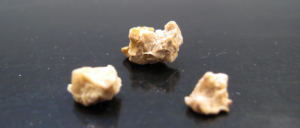 Today was the winter solstice, marking the longest night and the shortest day in the northern hemisphere. It truly felt like winter, with surprisingly low temperatures, brisk winds, and several inches of snow on the ground.
Today was the winter solstice, marking the longest night and the shortest day in the northern hemisphere. It truly felt like winter, with surprisingly low temperatures, brisk winds, and several inches of snow on the ground.
Author: Sima
Bacteria In The Kidney Microbiome Can Prevent Or Promote Kidney Stones

Finally, a study was done examining whether the kidneys have a microbiome (community of fungi, viruses, and bacteria). The answer is yes, the kidneys have a microbiome and the composition of the microbes plays a role in kidney health and whether a person develops kidney stones or not. This makes sense - all our other organs have microbiomes.
This multi-part study showed that the urinary tract is not sterile, and that low levels of bacteria are normal. Additionally, they found that the presence of the beneficial bacteria L. crispatus is found in the absence of kidney stones, while E.coli is associated with the development of kidney stones. (Interestingly, L. crispatus is also found in the healthy vagina and can treat bacterial vaginosis.)
The researchers found that the L. crispatus somehow blocked E.coli's ability to form kidney stones.
Antibiotic use was associated with bacteria that promoted the development of kidney stones because antibiotics kill off Lactobacillus species and promote the growth of kidney stone forming species (e.g., E. coli). Other studies also find that bacteria such as E.coli (as well as Proteus and Klebsiella) are frequently associated with UTIs, kidney stone formation, and kidney infection (pyelonephritis).
From Medical Xpress: First full characterization of kidney microbiome unlocks potential to prevent kidney stones
Cleveland Clinic researchers have found definitive proof of a kidney microbiome that influences renal health and kidney stone formation, demonstrating that the urinary tract is not sterile and low levels of bacteria are normal. ...continue reading "Bacteria In The Kidney Microbiome Can Prevent Or Promote Kidney Stones"
Eating Nuts Daily Associated With Lower Risk of Dementia
 Many people to this day avoid eating nuts because they view them as high calorie and high fat (umm...probably because the medical establishment said that for years). However, studies in the past decade repeatedly found that frequent nut consumption has health benefits.
Many people to this day avoid eating nuts because they view them as high calorie and high fat (umm...probably because the medical establishment said that for years). However, studies in the past decade repeatedly found that frequent nut consumption has health benefits.
A recent study found that high consumption of nuts is associated with a lower risk of dementia (about 12% lower risk than in those not consuming nuts). The researchers found that the protective effect was strongest in those who consumed up to a handful of unsalted nuts daily, especially if they were unsalted. However, consuming more than a handful of nuts per day did not have additional benefits.
From the science news website PsyPost: Can a handful of nuts a day keep dementia away? Research suggests it might
A new study, published in the journal GeroScience, highlights a promising link between nut consumption and a reduced risk of dementia. The findings suggest that middle-aged and older adults who regularly consume nuts have a 12% lower chance of developing dementia compared to non-consumers. This protective effect was particularly strong for those who consumed up to a handful of unsalted nuts daily, which appeared to yield the most significant cognitive benefits. ...continue reading "Eating Nuts Daily Associated With Lower Risk of Dementia"
Some Food Ingredients Were Developed to Deal With Industrial Waste

Americans now consume all sorts of ultra-processed foods daily. In fact, they now are the majority of the daily diet of Americans. What many people don't really understand is that ultra-processed foods involve all sorts of laboratory derived chemicals and ingredients. In fact, some (Crisco, saccharine, etc.) were developed to deal with industrial waste!
A good short video (6 minutes) about this from The Guardian: How We Created Ultra-processed Food From Industrial Waste
In the UK and US, more than half the average diet consists of ultra-processed foods. For some people, especially those who are younger, poorer or from disadvantaged areas, a diet comprising as much as 80% UPFs is typical, and this has been linked to a myriad of harmful effects to health.
Neelam Tailor traces the surprising journey of ultra-processed foods from their origins in industrial waste to today's complex ingredient lists and the regulatory loopholes that paved the way.
Another Reason to Avoid High-Fructose Corn Syrup

More worrisome news about high-fructose corn syrup. Researchers found that high fructose corn syrup actually speeds up and fuels the growth of cancer tumors in animals who already have cancer.
While this study was done in mice (with either breast cancer, melanoma, or cervical cancer), it is actually a scary finding because so many foods that Americans ingest daily contain high-fructose corn syrup. It is a sugar derived from corn starch and found in many foods: baked goods, soda, fast food, cereals, ice cream, etc. If you see it in an ingredient list, it means it is an ultra-processed food.
Bottom line: Read food ingredient lists and try to avoid eating foods with high-fructose corn syrup.
Excerpts from US Right To Know: High-fructose corn syrup fuels tumor growth in animals with cancer, a new study shows
High-fructose corn syrup, a sweetener commonly used in soda and ultra-processed foods, accelerates cancer tumor growth via the liver, according to research published last week [Dec. 4, 2024] in Nature.
High-fructose corn syrup (HFCS) is a sugar derived from corn starch. High fructose intake has been shown to contribute to the development of non-alcoholic fatty liver disease (NAFLD) and obesity, both of which are associated with systemic inflammation and altered lipid metabolism (the way the body processes fats). It has also been linked to diabetes, heart disease, and colorectal cancer. ...continue reading "Another Reason to Avoid High-Fructose Corn Syrup"
Mediterranean Style Diet Helps Gout Symptoms

Many people suffer from gout, with it being the leading cause of arthritis in men. Two recent studies looked at who gets gout (is it genetics or lifestyle?), and another study examined what kind of diet is best for treating symptoms.
Gout is a type of inflammatory arthritis that causes sudden, severe attacks of pain, swelling, and tenderness in one or more joints. These attacks, which can last a week or two, frequently start in the big toe or a lower limb.
The first study found that genetics, and not lifestyle, determines who gets gout. Lifestyle is frequently blamed (rich foods!, being overweight!). From Science Daily: Study busts myths about cause of gout
".. eating red meat, can trigger gout attacks, the fundamental cause is high urate levels, crystals in the joints, and an immune system primed to 'attack' the crystals -- genetics plays an important role in all of these processes."
Another study found that a Mediterranean style, whole foods, and plant-based diet improves gout symptoms, but a low-calorie or animal-based, and low-carbohydrate diet does not. The Mediterranean style diet also lowered serum uric acid (a cause of the symptoms). It is thought that this is because animal meat and ultra-processed foods are pro-inflammatory, while plant-based foods are not.
Excerpts from Medscape: Plant-Based Diet Improves Uric Acid Levels, Gout Symptoms
A Mediterranean-inspired plant-based diet improved self-reported measures of gout as well as uric acid levels, a pilot study has found. ...continue reading "Mediterranean Style Diet Helps Gout Symptoms"
Health Benefits of Maple Syrup

For those with a sweet tooth, maple syrup appears to be a healthier choice than sugar. A recent study found a number of health benefits in individuals who consumed some maple syrup daily in place of refined sugar.
Canadian researchers found that replacing just 2 tablespoons of refined sugars with 2 tablespoons of maple sugar daily for 8 weeks had significant beneficial health effects. Regular ingestion of maple syrup resulted in their bodies handling sugar after meals better (improved glycemic response), their blood pressure was significantly lower, their abdominal fat was reduced, an increase in beneficial gut species (bacteria linked with health), and a decrease in some gut bacterial species linked to inflammation and metabolic disorders.
In other words, there was a significant reduction in key cardiometabolic risk factors. By the way, similar results have been found in animal studies. This could be because maple syrup is a minimally processed sweetener rich in a number of beneficial nutrients and polyphenols. It's just boiled maple tree sap, with nothing added.
What made this study convincing was that persons were randomized to different groups (maple sugar or placebo), it was double-blind (no one knew what they were ingesting), and it it was a crossover study (meaning all participants were in both groups for 8 weeks with a gap in the middle). All participants were overweight adults with mild cardiometabolic alterations at the start of the study.
From SciTechDaily: Reducing Abdominal Fat: Researchers Uncover Surprising Health Benefits of Maple Syrup
A study published in The Journal of Nutrition reveals that replacing refined sugars with two tablespoons of maple syrup can significantly improve several cardiometabolic risk factors, such as blood sugar levels, blood pressure, and abdominal fat composition. This was the first placebo-controlled human clinical trial exploring the potential health benefits of maple syrup consumption. ...continue reading "Health Benefits of Maple Syrup"
Coffee Drinking Alters the Gut Microbiome

Drinking moderate amounts of coffee each day is associated with a number of health benefits. It turns out that the coffee is also feeding a particular strain of gut microbe - Lawsonibacter asaccharolyticus.
Researchers found that more people who drink coffee daily have Lawsonibacter asaccharolyticus in their gut microbiome (the community of microbes, bacteria, and viruses that live in the intestines) than people who don't drink coffee. Additionally, the more a person drinks coffee daily, the higher the levels of the bacteria.
Newborns and children rarely have this bacteria in their gut microbiome. The bacteria is mainly found in adults living in places with an urbanized Western-lifestyle. Further research showed that the coffee stimulates the growth of L. asaccharolyticus.
By the way, it appears to be a beneficial bacteria. And yes, many other studies find that what you eat (your daily diet) influences the composition of microbes living in the gut.
From Newsweek: What Coffee Does To Your Gut
Coffee drinking seems to alter which microorganisms live in our guts, with potentially far-reaching implications for health, a large study has found.
...continue reading "Coffee Drinking Alters the Gut Microbiome"

HAPPY THANKSGIVING!
School Vehicle Or School Vechicle?
 What do these School Vehicle labels say about the state of education in the US? One spelling error could be an inadvertent typo, but twice? I think not.
What do these School Vehicle labels say about the state of education in the US? One spelling error could be an inadvertent typo, but twice? I think not.
